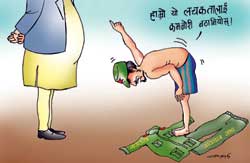 Caught between the government's foot-dragging and the mainstream parties' hands-off stand on the peace process, Maoist negotiator Matrika Yadav has come up with a gripping idea. Why not enshrine the right to rebel against an odious order as a basic human right? It's immaterial whether he deliberately chose to float the proposal as restive students returned to their tyre-burning and window-smashing selves. The urgency of understanding the range of our inalienable rights remains eternal.
Caught between the government's foot-dragging and the mainstream parties' hands-off stand on the peace process, Maoist negotiator Matrika Yadav has come up with a gripping idea. Why not enshrine the right to rebel against an odious order as a basic human right? It's immaterial whether he deliberately chose to float the proposal as restive students returned to their tyre-burning and window-smashing selves. The urgency of understanding the range of our inalienable rights remains eternal. Although Yadav represents a philosophy where the party towers over everything else, his idea resonates with the political laissez-faire anarchists were known for before the fraternity started emitting vibes of violence. States are inherently evil, they maintained, because they are coercive. As such, they lack any justifiable claim to the people's loyalty, support or obligation to obey its laws. And democratic states?
They're all the more reprehensible because they allow the majority to coerce the rest. The state exists, we are told, to create conditions that allow people to be themselves at their best. When the tiniest minority feels disenfranchised, it has the right to make itself heard and seen in any way it deems appropriate. (Could Baburam Bhattarai have transformed himself from a fringe radical luminary into a serious contender for premier within seven years any other way?)
Our mainstream politicians are the last people who need discourses on ways of expressing dissent. They are heirs to an illustrious legacy of rebellion perfected behind bars, underground and in exile. In varying degrees, everyone beginning from the Rana-era Arya Samaji social reformers and Ekadasi Sabha of government officials who sought to open up the oligarchy knew they were violating the law of the day. Each time kangresis and comrades set out to deprive the panchas of power and authority, they did so with full knowledge of the categories of state offence on the statute books. Defeat invariably brought greater government duress and deepened dissent. Their success in 1990 retroactively legalised their actions because there was hardly any legitimate form of opposition then.
To be sure, the Maoists have broken new ground in offering to place their army in the service of the mainstream parties to defend the people's rights. That overture isn't too appealing. There is little more than anecdotal evidence suggesting that armed action must be an integral part of revolution. Historically, repressive violence has been more successful than its insurrectional equivalent.
At the practical plane, few of the armed and indoctrinated lads and lasses are likely to become kangresis or moderate Marxist-Leninists in time for the elections. Campaigning used to be nasty enough when there were few rifle-totting retinues patrolling the ideological battle lines. There is lingering suspicion, moreover, that the rebel commanders may have ordered an operational pause primarily to ensure that reaction to their violence hadn't become greater than the action it produced. The mainstream doesn't want to be swept away by the flow from the extreme left.
Revolution generally presupposes innovation, you could argue. In that sense, change cannot be conceived within the context of what we know today. Marx and Engels may have got the countries wrong, but they were correct in reckoning that parts of the world were ripe for revolution. The obscurity of Bhattarai's new model of democracy, however, would have been less intimidating without the shadow international political history has cast on the deliberations. In the absence of credible evidence to the contrary, the mainstream will continue to consider the Maoists' bourgeois democracy to be a transitional arrangement propelled by the proletariat. In that case, freedom is likely to comprise swift retribution against enemies and purges against traitors and exploiters. And mass education would consist of self-criticism, drills on party ideology and discussions on how best to implement national policies in the larger interest of the state.
Girija Prasad Koirala and Madhav Kumar Nepal are in no mood to talk to Prime Minister Lokendra Bahadur Chand because they fear the emergence of similar conditions from the right end of the spectrum. They would be less inclined to walk along Prachanda's Path towards inevitable irrelevance. Especially not when the preamble to the constitution we already have sanctifies the street as the source of political change. Unless, of course, Yadav intends to incorporate insurrection in the chapter on fundamental rights as a way of building on the gains of the People's Movement.


